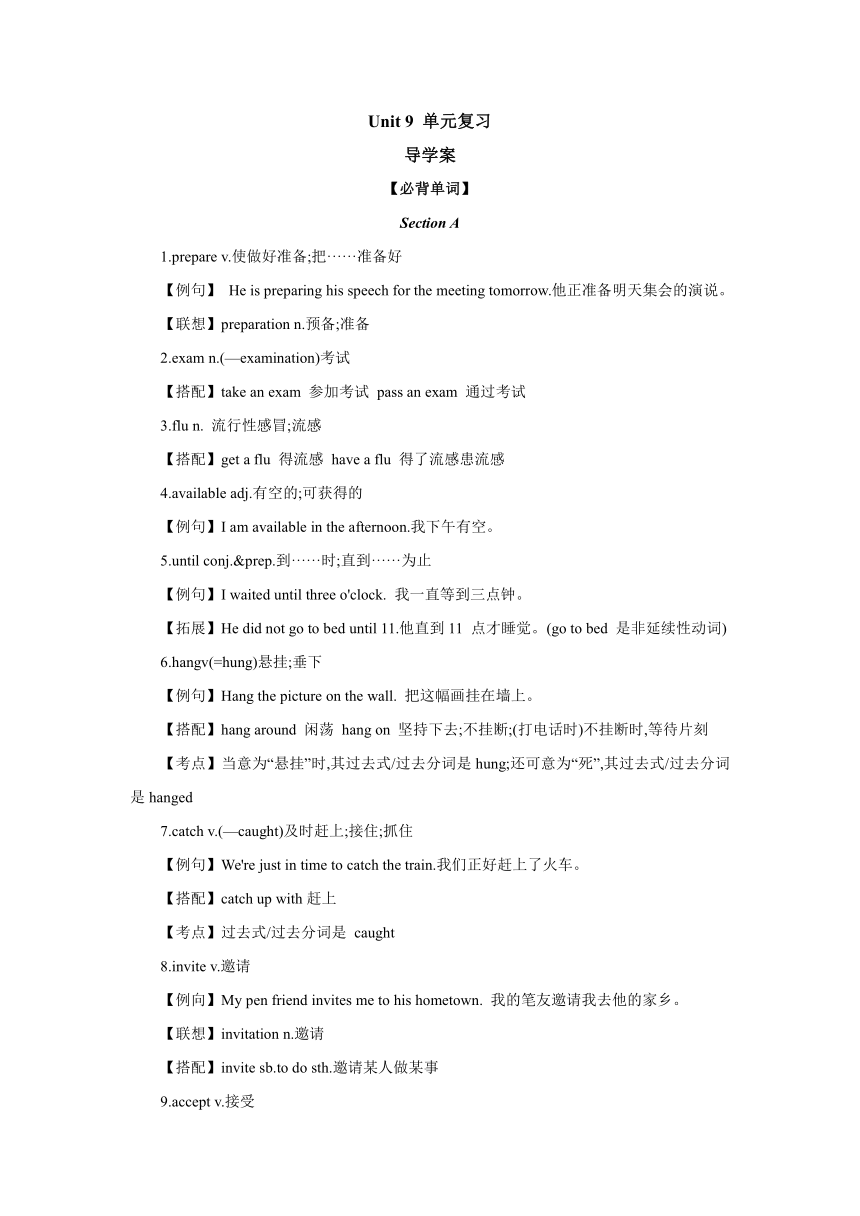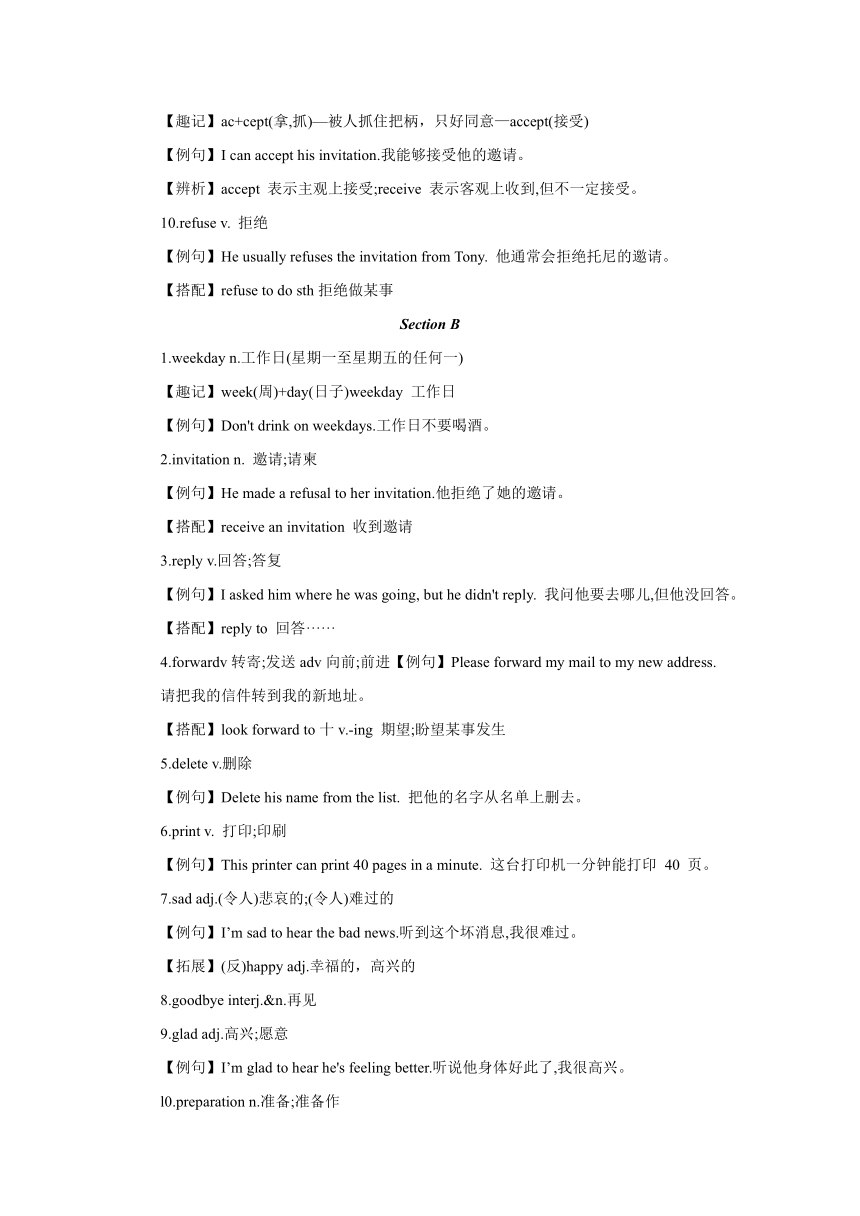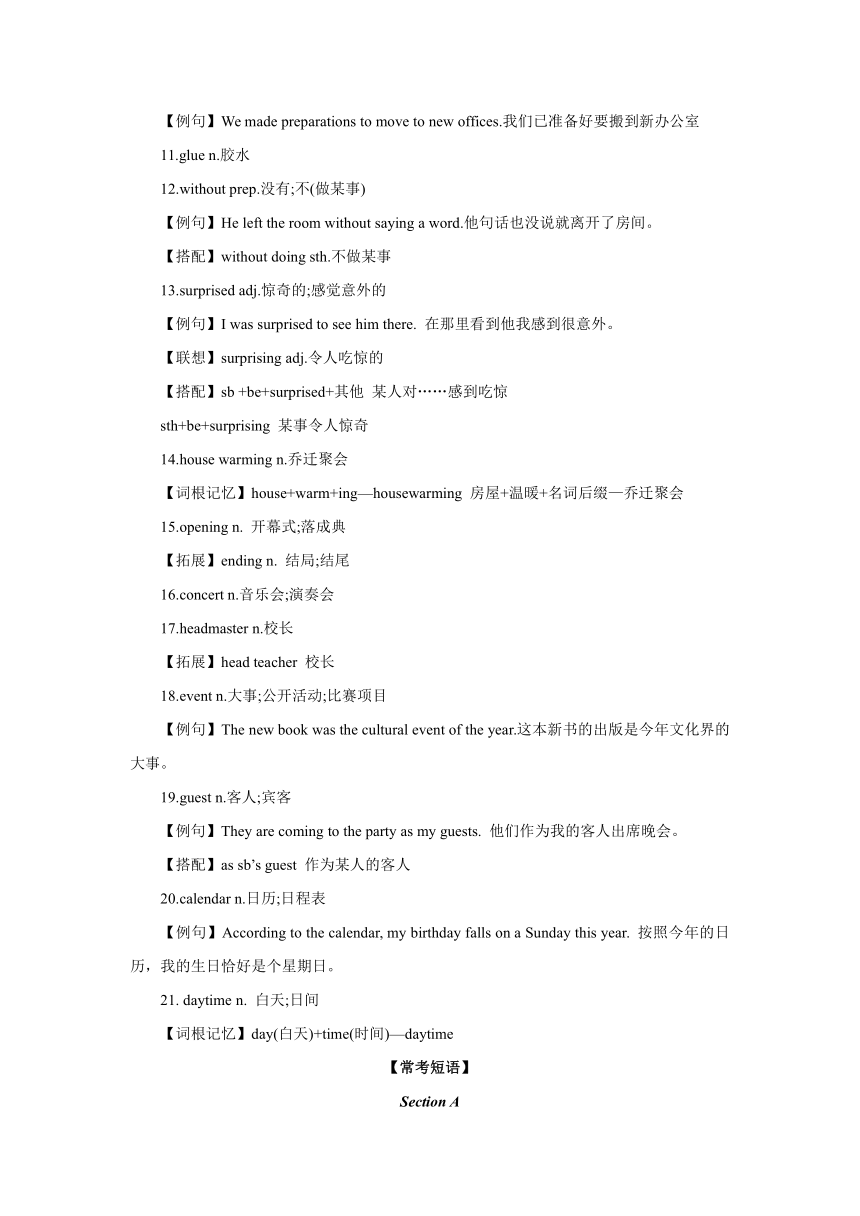人教版八年级上册Unit 9 Can you come to my party?单元复习 导学案
文档属性
| 名称 | 人教版八年级上册Unit 9 Can you come to my party?单元复习 导学案 |  | |
| 格式 | docx | ||
| 文件大小 | 20.4KB | ||
| 资源类型 | 教案 | ||
| 版本资源 | 人教新目标(Go for it)版 | ||
| 科目 | 英语 | ||
| 更新时间 | 2022-12-07 15:53:41 | ||
图片预览



文档简介
Unit 9 单元复习
导学案
【必背单词】
Section A
1.prepare v.使做好准备;把······准备好
【例句】 He is preparing his speech for the meeting tomorrow.他正准备明天集会的演说。
【联想】preparation n.预备;准备
2.exam n.(—examination)考试
【搭配】take an exam 参加考试 pass an exam 通过考试
3.flu n. 流行性感冒;流感
【搭配】get a flu 得流感 have a flu 得了流感患流感
4.available adj.有空的;可获得的
【例句】I am available in the afternoon.我下午有空。
5.until conj.&prep.到······时;直到······为止
【例句】I waited until three o'clock. 我一直等到三点钟。
【拓展】He did not go to bed until 11.他直到11 点才睡觉。(go to bed 是非延续性动词)
6.hangv(=hung)悬挂;垂下
【例句】Hang the picture on the wall. 把这幅画挂在墙上。
【搭配】hang around 闲荡 hang on 坚持下去;不挂断;(打电话时)不挂断时,等待片刻
【考点】当意为“悬挂”时,其过去式/过去分词是hung;还可意为“死”,其过去式/过去分词是hanged
7.catch v.(—caught)及时赶上;接住;抓住
【例句】We're just in time to catch the train.我们正好赶上了火车。
【搭配】catch up with赶上
【考点】过去式/过去分词是 caught
8.invite v.邀请
【例向】My pen friend invites me to his hometown. 我的笔友邀请我去他的家乡。
【联想】invitation n.邀请
【搭配】invite sb.to do sth.邀请某人做某事
9.accept v.接受
【趣记】ac+cept(拿,抓)—被人抓住把柄,只好同意—accept(接受)
【例句】I can accept his invitation.我能够接受他的邀请。
【辨析】accept 表示主观上接受;receive 表示客观上收到,但不一定接受。
10.refuse v. 拒绝
【例句】He usually refuses the invitation from Tony. 他通常会拒绝托尼的邀请。
【搭配】refuse to do sth拒绝做某事
Section B
1.weekday n.工作日(星期一至星期五的任何一)
【趣记】week(周)+day(日子)weekday 工作日
【例句】Don't drink on weekdays.工作日不要喝酒。
2.invitation n. 邀请;请柬
【例句】He made a refusal to her invitation.他拒绝了她的邀请。
【搭配】receive an invitation 收到邀请
3.reply v.回答;答复
【例句】I asked him where he was going, but he didn't reply. 我问他要去哪儿,但他没回答。
【搭配】reply to 回答······
4.forwardv转寄;发送adv向前;前进【例句】Please forward my mail to my new address.
请把我的信件转到我的新地址。
【搭配】look forward to十v.-ing 期望;盼望某事发生
5.delete v.删除
【例句】Delete his name from the list. 把他的名字从名单上删去。
6.print v. 打印;印刷
【例句】This printer can print 40 pages in a minute. 这台打印机一分钟能打印 40 页。
7.sad adj.(令人)悲哀的;(令人)难过的
【例句】I’m sad to hear the bad news.听到这个坏消息,我很难过。
【拓展】(反)happy adj.幸福的,高兴的
8.goodbye interj.&n.再见
9.glad adj.高兴;愿意
【例句】I’m glad to hear he's feeling better.听说他身体好此了,我很高兴。
l0.preparation n.准备;准备作
【例句】We made preparations to move to new offices.我们已准备好要搬到新办公室
11.glue n.胶水
12.without prep.没有;不(做某事)
【例句】He left the room without saying a word.他句话也没说就离开了房间。
【搭配】without doing sth.不做某事
13.surprised adj.惊奇的;感觉意外的
【例句】I was surprised to see him there. 在那里看到他我感到很意外。
【联想】surprising adj.令人吃惊的
【搭配】sb +be+surprised+其他 某人对……感到吃惊
sth+be+surprising 某事令人惊奇
14.house warming n.乔迁聚会
【词根记忆】house+warm+ing—housewarming 房屋+温暖+名词后缀—乔迁聚会
15.opening n. 开幕式;落成典
【拓展】ending n. 结局;结尾
16.concert n.音乐会;演奏会
17.headmaster n.校长
【拓展】head teacher 校长
18.event n.大事;公开活动;比赛项目
【例句】The new book was the cultural event of the year.这本新书的出版是今年文化界的大事。
19.guest n.客人;宾客
【例句】They are coming to the party as my guests. 他们作为我的客人出席晚会。
【搭配】as sb’s guest 作为某人的客人
20.calendar n.日历;日程表
【例句】According to the calendar, my birthday falls on a Sunday this year. 按照今年的日历,我的生日恰好是个星期日。
21. daytime n. 白天;日间
【词根记忆】day(白天)+time(时间)—daytime
【常考短语】
Section A
1.on Saturday afternoon 在周六下午
2.have to不得不
3.prepare for an exam为考试做准备
4.go to the doctor 去看医生
5.have the flu 患流感
6.help my parents帮助我的父母
7.cometothe party 来参加聚会
8.meet my friend 会见我的朋友
9.go to the party 去聚会
10.too much homework 太多作业
11.go to the movies 去看电影
12.another time其他时间
13.go bike riding 去骑自行车
14.last fall 去年秋天
15. hang out 闲逛;常去某处
【例句】He likes reading and he often hangs out in the book shop. 他喜欢阅读,并且经常逛书店。
16.after school放学后
17.on the weekend 在周末
18.study for an exam为考试而准备
19.visit/see sb.拜访某人
Section B
1. the day before yesterday 前天
【例句】He went to Beijing the day before yesterday. 前天他去北京了。
2. the day after tomorrow 后天
3.have a piano lesson 上钢琴课
4.look after 照看;照顾
【例句】He is old enough to look after himself. 他足够大了,能照顾自己了。
5.accept an invitation 接受邀请
6.turn down 拒绝
【例句】He turned down his good friend's advice. 他拒绝了好朋友的建议。
7.take a trip 去旅行
【例句】Let’s take a trip! 咱们去旅行吧!
8.at the end of在······尽头
【例句】 You can see a bookshop at the end of the road.在路的尽头你会看到一家书店。
9.help out(帮助······)分担工作解决难题
【例句】Do you need anyone to help out in the shop 店里的事你需要有人帮一把吗
10.the opening of... ·····的开幕式/落成典礼
11.reply in writing 书面回复
12.go shopping去购物
13.do homework 做家庭作业
14.go to the concert 去听音乐会
15.not...until 直到……才
【例】The noise didn't stop until midnight. 噪音一直到午夜才停止。
16.hear from 接到(某人的)信电话等
【例句】I heard from my mother last week.上周我收到了我母亲的来信。
17.help sb.(to) do sth. 有空做某事
18.write to sb.给某人写信
19.be available to do sth有空做某事
20.be sad to do sth做某事很悲伤
21.the best way to do sth做某事最好的方式
22.plan the game计划游戏
【语法总结】
情态动词can的用法:
can 作为一个常用情态动词,与其他情态动词一样,其后接动词原形。can 的否定形式是 cannot 或 can't,没有人称和数的变化,但有时态的变化,它的过去式为could.其后直接接动词原形
1.表示能力,意为“能;会”,具体指体力或脑力方面的能力。如:
I can play basketball. 我会打篮球。
She can't dance well. 她跳舞跳得不好。
2.表示允许,意为“可以;能够”。如:You can't go now.现在你不能走。
Can I use your pen 我可以用你的钢笔吗
3.表示委婉地邀请或向别人征求意见。如:
Can you come to my house 你能到我家里来吗
4.表示推测,意为“可能”。如:
Who's singing in the next room Can it be Mary
谁在隔壁房间唱歌 是玛丽吗
It can't be her. She has gone to New York. 不可能是她。她去纽约了。
can在表示邀请时的用法:
1.当用情态动词can 发出邀请时,要用其一般疑问句形式:Can you/he/they+动词原形 can 在此句型中表示请求的语气,意为“能;可以”。
2.表示接受邀请,可以说 Sure, I’d love to.“当然,我很愿意。”,其中 to 不可以省略;或 Sure, I think he/she/they will。“当然,我想他/她/他们会的。”
3.表示拒绝邀请时,可以用 Sorry, I can't. I..表示委婉拒绝,再用“have to十v.或“be+v.—ing”结构表达必须得做什么或要去做什么来说明理由。替他人拒绝时,可以回答 No, he/she/they can't,然后再用“have to+v.”或“be+v.—ing”来说明理由。
Can you play tennis with me 你能和我打网球吗
—Sure, I’d love to.当然,我很愿意。
Sorry, I can't. I have to do my homework.
对不起,我不能。我得做我的家庭作业。
【注意】can 在邀请中可以用 could 代替,语气更委婉
【拓展】向别人发出邀请、请求、建议或征求别人的意见,还有儿种表达方式,语气比较委婉,显得客气而有礼貌。
句型结构 含义 例句
Let's+do sth. 咱们做某事吧 Let’s go shopping.
Shall we+do sth. 我们做某事好吗 Shall we go out for a walk
Would you mind (not)+doing sth. 你介意(不)做某事吗 Would you mind closing the door
How/What about doing sth. 做某事怎么样 How about playing basketball
You'd better ( not )do sth. 你最好(不要)做某事 You'd better not read such books.
Why don't you do sth. Why not do sth. (你)为什么不做某事呢 Why don't you ask your teacher Why not ask your teacher
Would you like (not) to do sth. 你愿意(不)做某事吗 Would you like to have a rest
Would/Could you (not) do please sth. 请你(不要)做某事好吗 Would you please wait for me
1 —Could you please tell me how to improve my spoken English
—You ________improve your spoken English by joining the English corner.
A. can B. could C. must D. may
2 —________ you come with me to Lang Lang's piano concert this evening
—I'd love to, but I have to study for my math test.
A. Should B. May C. Must D. Can
3—_______I try on those shoes in the window
—_______. They are just on show.
A. Could; Yes, you can B. Can; Sorry, you couldn't
C. Could; Sorry, you can't D. Can; Yes, you could
导学案
【必背单词】
Section A
1.prepare v.使做好准备;把······准备好
【例句】 He is preparing his speech for the meeting tomorrow.他正准备明天集会的演说。
【联想】preparation n.预备;准备
2.exam n.(—examination)考试
【搭配】take an exam 参加考试 pass an exam 通过考试
3.flu n. 流行性感冒;流感
【搭配】get a flu 得流感 have a flu 得了流感患流感
4.available adj.有空的;可获得的
【例句】I am available in the afternoon.我下午有空。
5.until conj.&prep.到······时;直到······为止
【例句】I waited until three o'clock. 我一直等到三点钟。
【拓展】He did not go to bed until 11.他直到11 点才睡觉。(go to bed 是非延续性动词)
6.hangv(=hung)悬挂;垂下
【例句】Hang the picture on the wall. 把这幅画挂在墙上。
【搭配】hang around 闲荡 hang on 坚持下去;不挂断;(打电话时)不挂断时,等待片刻
【考点】当意为“悬挂”时,其过去式/过去分词是hung;还可意为“死”,其过去式/过去分词是hanged
7.catch v.(—caught)及时赶上;接住;抓住
【例句】We're just in time to catch the train.我们正好赶上了火车。
【搭配】catch up with赶上
【考点】过去式/过去分词是 caught
8.invite v.邀请
【例向】My pen friend invites me to his hometown. 我的笔友邀请我去他的家乡。
【联想】invitation n.邀请
【搭配】invite sb.to do sth.邀请某人做某事
9.accept v.接受
【趣记】ac+cept(拿,抓)—被人抓住把柄,只好同意—accept(接受)
【例句】I can accept his invitation.我能够接受他的邀请。
【辨析】accept 表示主观上接受;receive 表示客观上收到,但不一定接受。
10.refuse v. 拒绝
【例句】He usually refuses the invitation from Tony. 他通常会拒绝托尼的邀请。
【搭配】refuse to do sth拒绝做某事
Section B
1.weekday n.工作日(星期一至星期五的任何一)
【趣记】week(周)+day(日子)weekday 工作日
【例句】Don't drink on weekdays.工作日不要喝酒。
2.invitation n. 邀请;请柬
【例句】He made a refusal to her invitation.他拒绝了她的邀请。
【搭配】receive an invitation 收到邀请
3.reply v.回答;答复
【例句】I asked him where he was going, but he didn't reply. 我问他要去哪儿,但他没回答。
【搭配】reply to 回答······
4.forwardv转寄;发送adv向前;前进【例句】Please forward my mail to my new address.
请把我的信件转到我的新地址。
【搭配】look forward to十v.-ing 期望;盼望某事发生
5.delete v.删除
【例句】Delete his name from the list. 把他的名字从名单上删去。
6.print v. 打印;印刷
【例句】This printer can print 40 pages in a minute. 这台打印机一分钟能打印 40 页。
7.sad adj.(令人)悲哀的;(令人)难过的
【例句】I’m sad to hear the bad news.听到这个坏消息,我很难过。
【拓展】(反)happy adj.幸福的,高兴的
8.goodbye interj.&n.再见
9.glad adj.高兴;愿意
【例句】I’m glad to hear he's feeling better.听说他身体好此了,我很高兴。
l0.preparation n.准备;准备作
【例句】We made preparations to move to new offices.我们已准备好要搬到新办公室
11.glue n.胶水
12.without prep.没有;不(做某事)
【例句】He left the room without saying a word.他句话也没说就离开了房间。
【搭配】without doing sth.不做某事
13.surprised adj.惊奇的;感觉意外的
【例句】I was surprised to see him there. 在那里看到他我感到很意外。
【联想】surprising adj.令人吃惊的
【搭配】sb +be+surprised+其他 某人对……感到吃惊
sth+be+surprising 某事令人惊奇
14.house warming n.乔迁聚会
【词根记忆】house+warm+ing—housewarming 房屋+温暖+名词后缀—乔迁聚会
15.opening n. 开幕式;落成典
【拓展】ending n. 结局;结尾
16.concert n.音乐会;演奏会
17.headmaster n.校长
【拓展】head teacher 校长
18.event n.大事;公开活动;比赛项目
【例句】The new book was the cultural event of the year.这本新书的出版是今年文化界的大事。
19.guest n.客人;宾客
【例句】They are coming to the party as my guests. 他们作为我的客人出席晚会。
【搭配】as sb’s guest 作为某人的客人
20.calendar n.日历;日程表
【例句】According to the calendar, my birthday falls on a Sunday this year. 按照今年的日历,我的生日恰好是个星期日。
21. daytime n. 白天;日间
【词根记忆】day(白天)+time(时间)—daytime
【常考短语】
Section A
1.on Saturday afternoon 在周六下午
2.have to不得不
3.prepare for an exam为考试做准备
4.go to the doctor 去看医生
5.have the flu 患流感
6.help my parents帮助我的父母
7.cometothe party 来参加聚会
8.meet my friend 会见我的朋友
9.go to the party 去聚会
10.too much homework 太多作业
11.go to the movies 去看电影
12.another time其他时间
13.go bike riding 去骑自行车
14.last fall 去年秋天
15. hang out 闲逛;常去某处
【例句】He likes reading and he often hangs out in the book shop. 他喜欢阅读,并且经常逛书店。
16.after school放学后
17.on the weekend 在周末
18.study for an exam为考试而准备
19.visit/see sb.拜访某人
Section B
1. the day before yesterday 前天
【例句】He went to Beijing the day before yesterday. 前天他去北京了。
2. the day after tomorrow 后天
3.have a piano lesson 上钢琴课
4.look after 照看;照顾
【例句】He is old enough to look after himself. 他足够大了,能照顾自己了。
5.accept an invitation 接受邀请
6.turn down 拒绝
【例句】He turned down his good friend's advice. 他拒绝了好朋友的建议。
7.take a trip 去旅行
【例句】Let’s take a trip! 咱们去旅行吧!
8.at the end of在······尽头
【例句】 You can see a bookshop at the end of the road.在路的尽头你会看到一家书店。
9.help out(帮助······)分担工作解决难题
【例句】Do you need anyone to help out in the shop 店里的事你需要有人帮一把吗
10.the opening of... ·····的开幕式/落成典礼
11.reply in writing 书面回复
12.go shopping去购物
13.do homework 做家庭作业
14.go to the concert 去听音乐会
15.not...until 直到……才
【例】The noise didn't stop until midnight. 噪音一直到午夜才停止。
16.hear from 接到(某人的)信电话等
【例句】I heard from my mother last week.上周我收到了我母亲的来信。
17.help sb.(to) do sth. 有空做某事
18.write to sb.给某人写信
19.be available to do sth有空做某事
20.be sad to do sth做某事很悲伤
21.the best way to do sth做某事最好的方式
22.plan the game计划游戏
【语法总结】
情态动词can的用法:
can 作为一个常用情态动词,与其他情态动词一样,其后接动词原形。can 的否定形式是 cannot 或 can't,没有人称和数的变化,但有时态的变化,它的过去式为could.其后直接接动词原形
1.表示能力,意为“能;会”,具体指体力或脑力方面的能力。如:
I can play basketball. 我会打篮球。
She can't dance well. 她跳舞跳得不好。
2.表示允许,意为“可以;能够”。如:You can't go now.现在你不能走。
Can I use your pen 我可以用你的钢笔吗
3.表示委婉地邀请或向别人征求意见。如:
Can you come to my house 你能到我家里来吗
4.表示推测,意为“可能”。如:
Who's singing in the next room Can it be Mary
谁在隔壁房间唱歌 是玛丽吗
It can't be her. She has gone to New York. 不可能是她。她去纽约了。
can在表示邀请时的用法:
1.当用情态动词can 发出邀请时,要用其一般疑问句形式:Can you/he/they+动词原形 can 在此句型中表示请求的语气,意为“能;可以”。
2.表示接受邀请,可以说 Sure, I’d love to.“当然,我很愿意。”,其中 to 不可以省略;或 Sure, I think he/she/they will。“当然,我想他/她/他们会的。”
3.表示拒绝邀请时,可以用 Sorry, I can't. I..表示委婉拒绝,再用“have to十v.或“be+v.—ing”结构表达必须得做什么或要去做什么来说明理由。替他人拒绝时,可以回答 No, he/she/they can't,然后再用“have to+v.”或“be+v.—ing”来说明理由。
Can you play tennis with me 你能和我打网球吗
—Sure, I’d love to.当然,我很愿意。
Sorry, I can't. I have to do my homework.
对不起,我不能。我得做我的家庭作业。
【注意】can 在邀请中可以用 could 代替,语气更委婉
【拓展】向别人发出邀请、请求、建议或征求别人的意见,还有儿种表达方式,语气比较委婉,显得客气而有礼貌。
句型结构 含义 例句
Let's+do sth. 咱们做某事吧 Let’s go shopping.
Shall we+do sth. 我们做某事好吗 Shall we go out for a walk
Would you mind (not)+doing sth. 你介意(不)做某事吗 Would you mind closing the door
How/What about doing sth. 做某事怎么样 How about playing basketball
You'd better ( not )do sth. 你最好(不要)做某事 You'd better not read such books.
Why don't you do sth. Why not do sth. (你)为什么不做某事呢 Why don't you ask your teacher Why not ask your teacher
Would you like (not) to do sth. 你愿意(不)做某事吗 Would you like to have a rest
Would/Could you (not) do please sth. 请你(不要)做某事好吗 Would you please wait for me
1 —Could you please tell me how to improve my spoken English
—You ________improve your spoken English by joining the English corner.
A. can B. could C. must D. may
2 —________ you come with me to Lang Lang's piano concert this evening
—I'd love to, but I have to study for my math test.
A. Should B. May C. Must D. Can
3—_______I try on those shoes in the window
—_______. They are just on show.
A. Could; Yes, you can B. Can; Sorry, you couldn't
C. Could; Sorry, you can't D. Can; Yes, you could
同课章节目录
- Unit 1 Where did you go on vacation?
- Section A
- Section B
- Unit 2 How often do you exercise?
- Section A
- Section B
- Unit 3 I'm more outgoing than my sister.
- Section A
- Section B
- Unit 4 What's the best movie theater?
- Section A
- Section B
- Unit 5 Do you want to watch a game show?
- Section A
- Section B
- Unit 6 I'm going to study computer science.
- Section A
- Section B
- Unit 7 Will people have robots?
- Section A
- Section B
- Unit 8 How do you make a banana milk shake?
- Section A
- Section B
- Unit 9 Can you come to my party?
- Section A
- Section B
- Unit 10 If you go to the party, you'll have a grea
- Section A
- Section B
